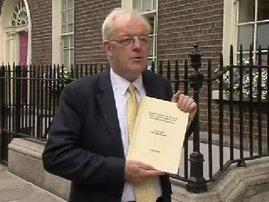This is still a rich country

Ireland is not broke, just dysfunctional and that could be easily remedied if the political will to do so existed. By Vincent Browne.
ON RTÉ the other morning there was another example of the station’s relentless mischaracterisation of the present crisis, a mischaracterisation that, coincidentally, fits neatly into the agenda of the Government and, as it happens, of an elite here.
It was just a remark which one might normally ignore but since it was so much a part of that mischaracterisation agenda, it deserves attention. It was simply: “we are broke”, meaning the country was broke or this society was broke.
(Picture: Colm McCarthy presents An Bord Snip Nua)
The country or this society is not broke. We remain one of the richest countries in the world, at least in terms of our GNP, probably around the 16th richest country in the world.
And the refusal to acknowledge this reality by repeated claims that we are broke feeds the mindset that we have to impoverish the already impoverished to get us out of our budgetary predicament.
There is a crisis concerning the State’s finances, a huge hole of around €20 billion a year, but the country’s GNP is around €130 billion, which gives us a per capita income of around €31,000 and there are very few countries that enjoy a per capita income of more than that. €31,000 for every man, woman and child is a lot of money – it means, for instance, a family of four getting €124,000 a year, on average.
According to Eurostat (the statistical agency for the EU), Ireland had one of the highest purchasing-power standards of any country in the world, even in 2009, the year of our huge recession. The data is expressed in relation to the average GDP for the EU 27 member states, at 100. It shows Ireland at 137, with only Luxembourg ahead of us.
Yes, GDP comparisons distort Ireland’s position because of the huge outflow of income from foreign multinationals, a lot of it simply transfer pricing (ie not real income at all), so an adjustment has to be made.
The adjustment our own Central Statistics Office (CSO) makes is around 19 per cent – so our GNP is only 81 per cent of our GDP. So making that adjustment to the Eurostat data, we come out at 106 in terms of GDP. That puts us behind Luxembourg, Belgium, Austria and the UK, around the same level as France but ahead of everyone else. And there are only a few other countries in the world richer than the EU ones – the US, Canada, Japan and a few of the Gulf states.
So, folks, we are not broke, far from it and the repeated assertion that we are serves only to frighten people into accepting hugely unfair corrections to our public finances.
The State costs around €53 billion to run, taxes are running at around only €33 billion, hence the hole. The problem is not that public expenditure is too high, but that our taxes are too low.
In the EU the average size of public expenditure as a proportion of total national income is around 50 per cent. At present in Ireland our public expenditure as a proportion of our national income is just 40 per cent.
Every year the CSO publishes its Survey on Income and Living Conditions (Silc). The last report showed that in 2008 the average gross household income was €60,581. Average net disposable household income was €49,043.
Even if one applies a discount of 11 per cent for 2009, at €44,575, the net average disposable household income is still very high. The difficulty is that the income is distributed very unevenly.
That Silc survey showed that the disposable income of the top 10 per cent of households was €127,000, while that for the bottom 10 per cent was €11,180 and this was after tax deductions and welfare additions. Households in the top 10-20 per cent bracket had disposable income of almost €80,000.
The OECD, on the basis of data supplied by the CSO, reported that in the mid-2000s Ireland had one of the highest rates of income inequality in the developed world – 22nd out of 30 countries, far more unequal than not just the Scandinavian countries, but countries such as Austria, Belgium, the Netherlands, France, Germany, Australia, Canada, Spain, even Greece.
Only the likes of the UK (after New Labour), Germany, Italy, the US and Mexico were worse.
Yes, there is some evidence that the recent levies may have ameliorated this ranking somewhat, but, almost certainly we are still worse than the OECD average.
Wouldn’t you think An Bord Snip Nua might have adverted to the option of snipping the income of the top 20 per cent of households, as an alternative to snipping social welfare, even if this was not strictly within the terms of reference? Might it not have suggested snipping it sufficiently to pay for the hole in the public finances and leave education, welfare the health alone?
That might put Ireland in the same rankings in the income inequality league as Luxembourg, Belgium or Holland and they are not exactly egalitarian Soviets.
The country is not broke. It is just dysfunctional. We could fix it quite easily, if only there were the political will to do that and if only there was a sufficient sense of social solidarity to permit it.
